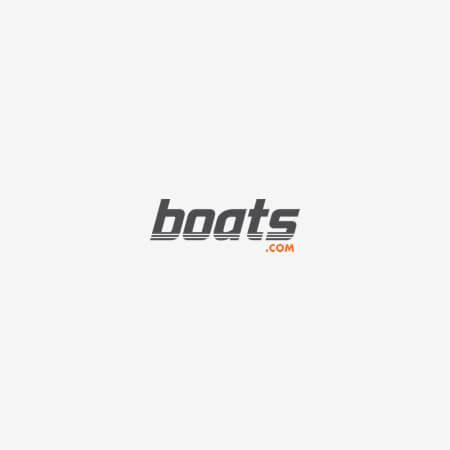High Performance with Nigel Hook: True Brit
Through good times and bad, offshore racer Nigel Hook always rises above the fray.
In the perennially turbulent world of offshore powerboat racing, British-born and raised Nigel Hook is the rarest of birds—a longtime racer who no one ever has a bad thing to say about. Sure, Hook, 54, is a tough competitor on the racecourse, and he’s hungry to win. But off the racecourse Hook is a perfect English gentleman, one who happens to hold dual citizenship in the United Kingdom and the United States. That transatlantic presence, plus a couple of world championships along the way, are a large part of why he has been able to retain sponsorship from Lucas Oil for well over a decade – it’s currently is the longest-running team sponsorship in offshore racing.

Hook’s current ride is a 48-foot Mystic V-bottom designed by Ocke Mannefelt. Photo by Karel Overlaet.
“I was inspired to race by my uncle Roger Hook in England,” says Hook. “Our first race was the Dawlish 100 in 1974, which did in a 19-foot monohull with twin 100-hp Mercury outboards.”
Hook ran several races with his uncle before Roger passed away. In 1978, he moved to Southern California—he lives in the beach city of Del Mar, just outside San Diego—and in 1990 he teamed up with noted racer Rick Bowling on the ill-fated Offshore Performance Tour. He later raced with other serious offshore talents including Craig Archer, Steve Neely, and Paul Whittier.
“Since 1990, I have raced every year either nationally or internationally,” says Hook.
Hook has raced in 25 countries on five continents. Early on, his racing travels took him to Venezuela with teammate Mike Seebold, as well as to Key West several times, where he won the Super Boat International World Super V Unlimited class title in 2006 and the Super V class title in 2009. From there it was off to the Europe- and Asia-based Powerboat P1 circuit, where he raced in the Evolution class in a 48-foot Mystic V-bottom with Michael Silfverberg.
“Michael is such a talented racer and fierce competitor,” says Hook. “I’ve never had a better teammate.”

Nigel Hook (right) and Michael Silfverberg. Photo by Karel Overlaet.
But not long into the 2010 season, Powerboat P1 financier Asif Rangoonwalla pulled the plug on the Evolution and SuperSport classes, essentially leaving both divisions homeless. The classes were picked up by Ocean Gran Prix, and between outgoing Powerboat P1 and OGP the series was able to pull off ten events that year.
Television coverage sparked Hook’s initial move to Powerboat P1 and kept him with OGP when Powerboat P1 went south. He has not decided whether he will compete in Europe or the U.S. in 2012.
“It’s going to be a difficult decision,” he says. “With the Ocean Gran Prix not firing on all eight cylinders, the competition has fallen off. We have only four boats in our class. But we’ve had television coverage going in 500 million homes, which makes our sponsor happy. We have to balance that with what’s going on over here. John Carbonell of SBI has certainly been as consistent as anyone else, and he has his schedule out through 2012. The choices are up in the air. Our main question is: Where can we race that will deliver the best value for our sponsor?”
Whatever series Hook selects for 2012, he has a formidable team behind him. In the fall, he hired renowned offshore racing world champion Jerry Gilbreath as his racing director. Gilbreath joins accomplished team manager Janet Wilson on the Lucas Oil team. Because he runs a Mystic, Hook also is able to tap into the talent of Mystic founder and owner John Cosker.
“John is the best boatbuilder I’ve ever worked with,” says Hooks. “His computer skills for modeling the boat’s structure and integrity are unmatched. He is a key partner in our long-term relationship.”
(Read Mystic 50 Open Cockpit: The Ultimate Pleasure Cat)

A view into the cockpit with Nigel Hook and Michael Silfverberg.
Of course, like every other offshore racer in the world, Hook has a “day job.” For 30 years, he has owned a company called Dataskill, working with larger companies such as IBM in data acquisition and interpretation.
Hook has no plans to retire from either his day job or offshore racing—particularly the latter—anytime soon.
“I don’t really see an end to it,” he says. “I’m as fit now as I was 20 years ago. That’s a tremendous incentive to stay very fit.”
But what burns out most offshore racers isn’t a lack of fitness, or even the lack of capital to support an expensive hobby with very little return on investment. The endless internal politics are what most racers cite as their reason for leaving the sport. Hook says that’s never been a problem for him.
“It doesn’t really wear on me because it never really changes—it’s not just in the U.S., it’s around the world,” he says, then laughs. “I think it’s common in all motorsports. I’ve now been hooked up with Lucas Oil for eleven years, and I’m very fortunate. What makes the politics more difficult is the lack of sponsorship. Teams that have sponsors tend to be a lot more cooperative with the promoters than the teams who are just doing it for fun.”
—Matt Trulio











